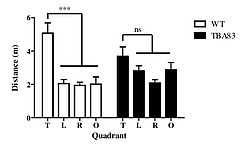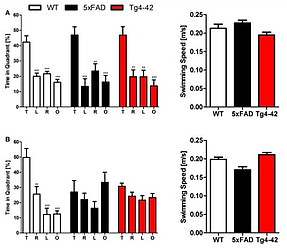Animal model for sporadic Alzheimer's Disease
Scientists of the University of Göttingen developed a transgenic mouse model for sporadic Alzheimer’s Disease (tg4-42 = TBA83). This is the first mouse model without any mutations showing neurological deficits by transgenic over-expressing a major form of amyloid beta peptides (N-truncated Abeta 4-42) found in the brain of AD patients. Abeta 4-42 was the first peptide discovered in AD-typical plaques in 1986. The neurological phenotype resembles that of mouse models with neurodegeneration in the hippocampus.
Challenge
The sporadic form of Alzheimer disease (AD) is the most common form accounting for 90-95% of cases. Surprisingly, there is no animal model for sporadic AD available on the market. AD mouse models generally express mutant Amyloid Precursor Protein (APP), which liberates amyloid beta peptides. The latter are the toxic agents in AD. It is well established however that precursor APP overexpression causes a plethora of unwanted effects. APP has an established growth factor function competing with the pathological effect of Abeta.
Our Solution
Scientists at the University of Göttingen developed a transgenic mouse model for sporadic Alzheimer's Disease. It does not have any mutation and it shows neurological deficits by transgenic over-expression of a major form of amyloid beta peptides (N-truncated Abeta 4-42) found in the brain of AD patients.

Morris water maze test in 9 months old female mice (10 mice per group). Tg4-42 mice expressing Abeta 4-42 peptides versus wildtype littermate controls. Tg4-42 mice showed a significant reduced learning behavior. (Abbreviations: T, target quadrant; L, left quadrant; R, right quadrant; O, opposite quadrant)(Source: T. Bayer).

Comparison of mouse models Tg4-42 vs 5XFAD. Morris water test with female young (A) and aged (B) Tg4-42 mice (red), 5XFAD (black) mice and WT (white) littermate controls. There was no difference of the swimming speed between the groups. Both AD animal models show similar learning and memory deficits in the Morris water maze and fear conditioning tasks (Source: T. Bayer).
Advantages
- First AD animal model without mutations.
- No artificial or inherited familial mutations, representing the more common form of sporadic AD.
- No interfering effect of neurotrophic and synaptotrophic activity by APP overexpression.
- Current AD animal models with mutatios either from AD families represent only 5-10% of all AD cases.
- The model system is based on the amyloid hypothesis by transgenic over-expressing of the naturally occuring form of N-truncated amyloid beta peptide 4-42).
- Good and effective breeding.
- Development of neurological deficits at about 12 months:
- Neurodegeneration particularly in hippocampus.
- Learning and memory deficits.
- Intraneuronal Abeta aggregation
Applications
- Excellent model for efficacy testing for drug screening for AD therapy.
- Excellent model for efficacy testing of potential therapeutic approaches for AD.
Suitable for testing:
- Abeta aggregation inhibitors or modulators.
- Cognitive enhancers or modulators.
- Neurotransmitter receptor pharmacology enhancer or modulators.
- Abeta degrading enzyme (for example neprilysin, insulin degrading enzyme, etc..) pharmacology.
Developmental Status
Sale of breading pairs at MBM ScienceBridge/ Georg-August-University - Medical Center Göttingen.
Patent Status
No IP - we are selling/licensing this unique animal model for sporadic AD.
References
Acta Neuropathol 2013, 126:189-205; DOI 10.1007/s00401-013-1129-2.
Frontiers in Aging Neuroscience 2014, 6, article 75, 1-28; doi:10.3389/fnagi.2014.00075.
Transl Psychiatry 2016, 6, e800; doi:10.1038/tp.2016.65.
http://www.uni-goettingen.de/en/83511.html
Contact
Dr. Stefan Uhle
Patent Manager Life Sciences
E-Mail: This email address is being protected from spambots. You need JavaScript enabled to view it.
Tel.: +49-551-30724154
Reference: BioT-1313-UMG
Tags: Animal models, Life science
